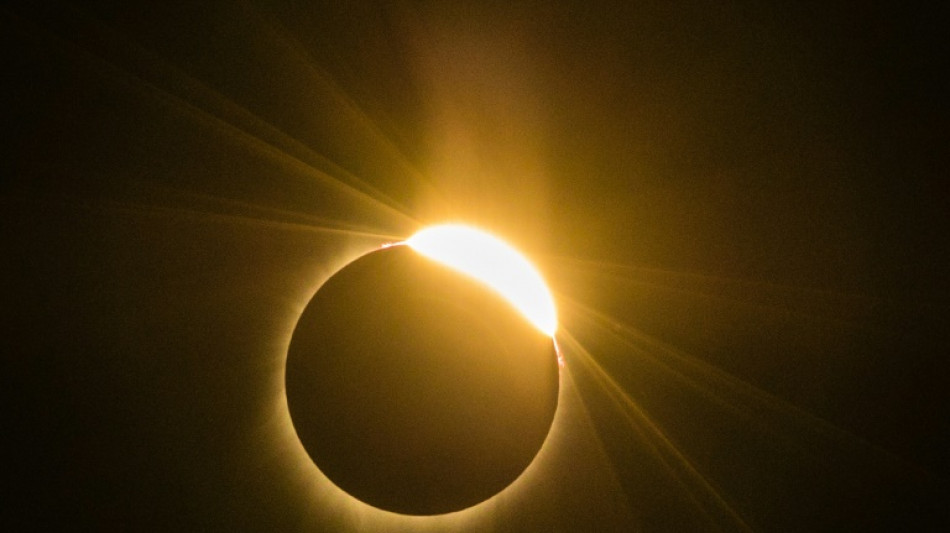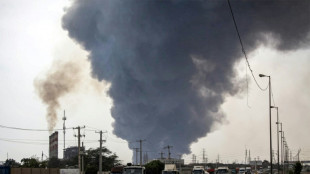
-
 South Korea's Ryu and Japan's Saigo share LPGA Chevron lead
South Korea's Ryu and Japan's Saigo share LPGA Chevron lead
-
Canada leaders make closing pitches in campaign upended by Trump

-
 De Bruyne's Man City exit 'so difficult' for Guardiola
De Bruyne's Man City exit 'so difficult' for Guardiola
-
'No regrets' for Amorim over Man Utd move

-
 Lyon and Strasbourg win to close in on Europe, Montpellier relegated from Ligue 1
Lyon and Strasbourg win to close in on Europe, Montpellier relegated from Ligue 1
-
Toulouse thrash Castres as Top 14 pursuers stumble

-
 Djokovic crashes to nervous Arnaldi in Madrid opener, Swiatek advances
Djokovic crashes to nervous Arnaldi in Madrid opener, Swiatek advances
-
Olympic champs Russell, Davis-Woodhall win at Drake Relays

-
 Browns end Sanders long draft slide
Browns end Sanders long draft slide
-
Cavs crush Heat, on brink of NBA playoff sweep

-
 Fire rages after major blast at Iran port kills 8, injures hundreds
Fire rages after major blast at Iran port kills 8, injures hundreds
-
Kiwi Beamish wins Penn Relays 1,500m crown with late kick

-
 Mbappe on Real Madrid bench for Clasico Copa del Rey final
Mbappe on Real Madrid bench for Clasico Copa del Rey final
-
England survive France fightback to seal Women's 6 Nations slam

-
 Palace sweep past Villa to reach FA Cup final
Palace sweep past Villa to reach FA Cup final
-
CAF appoint Moroccan Lekjaa first vice-president

-
 Major blast at Iran port kills 5, injures hundreds
Major blast at Iran port kills 5, injures hundreds
-
Rodgers vows to stay with Celtic after fourth successive Scottish title

-
 Ipswich relegated as Newcastle, Chelsea boost top five bids
Ipswich relegated as Newcastle, Chelsea boost top five bids
-
Canada leaders make final pitches in campaign upended by Trump

-
 Mullins -- Ireland's national training treasure
Mullins -- Ireland's national training treasure
-
US, Iran say progress in 'positive' nuclear talks

-
 Mullins emulates O'Brien with second successive trainer's title
Mullins emulates O'Brien with second successive trainer's title
-
Ipswich relegated after one season in Premier League

-
 Just Stop Oil activist group holds final march
Just Stop Oil activist group holds final march
-
Djokovic crashes to nervous Arnaldi in Madrid opener

-
 Syria's Kurds demand 'democratic decentralised' Syria
Syria's Kurds demand 'democratic decentralised' Syria
-
Leverkusen win to delay Bayern and Kane's title party

-
 Buenos Aires farewells native pontiff with tears and calls to action
Buenos Aires farewells native pontiff with tears and calls to action
-
Turkey's opposition says Erdogan's canal plan behind latest arrests

-
 Maresca hails 'nasty' Chelsea as top five bid stays alive
Maresca hails 'nasty' Chelsea as top five bid stays alive
-
Trump raises Putin doubts after Zelensky talks at pope's funeral

-
 Major blast at Iran port kills 4, injures hundreds
Major blast at Iran port kills 4, injures hundreds
-
Napoleon's sword to be sold at auction in Paris

-
 Iran, US discuss nuclear deal in third round of talks
Iran, US discuss nuclear deal in third round of talks
-
Buenos Aires farewells native pontiff with call to action

-
 Warholm sets hurdles world record at Diamond League, Holloway shocked
Warholm sets hurdles world record at Diamond League, Holloway shocked
-
US students 'race' sperm in reproductive health stunt

-
 Wikileaks founder Assange joins crowds for pope funeral
Wikileaks founder Assange joins crowds for pope funeral
-
Leader Marc Marquez claims Spanish MotoGP sprint victory

-
 Celtic win fourth successive Scottish Premiership title
Celtic win fourth successive Scottish Premiership title
-
Jackson ends drought as Chelsea boost top five push

-
 Warholm sets 300m hurdles world record in Diamond League opener
Warholm sets 300m hurdles world record in Diamond League opener
-
Major blast at south Iran port kills 4, injures hundreds

-
 Russia says retook Kursk from Ukraine with North Korean help
Russia says retook Kursk from Ukraine with North Korean help
-
Francis laid to rest as 400,000 mourn pope 'with an open heart'

-
 Trump, Zelensky meet on sidelines of pope's funeral
Trump, Zelensky meet on sidelines of pope's funeral
-
'Shared loss': Filipino Catholics bid Pope Francis farewell

-
 Families unable to reunite as India-Pakistan border slams shut
Families unable to reunite as India-Pakistan border slams shut
-
Major blast at south Iran port injures hundreds


What do scientists hope to learn from total solar eclipse in US?
When a rare total solar eclipse sweeps across North America on April 8, scientists will be able to gather invaluable data on everything from the Sun's atmosphere to strange animal behaviors -- and even possible effects on humans.
It comes with the Sun near the peak of its 11-year solar cycle, setting the stage for a breathtaking display: The corona will glow spectacularly from the Moon's silhouette along the path of totality, a corridor stretching from Mexico to Canada via the United States.
Total solar eclipses offer "incredible scientific opportunities," NASA Deputy Administrator Pam Melroy told a press conference this week about the celestial event.
The US space agency is one of the institutions at the ready for the eclipse, with plans to launch so-called "sounding rockets" to study the effects on Earth's upper atmosphere.
Here is a look at what researchers are hoping to learn from the upcoming eclipse:
- Sun's atmosphere -
When the Moon passes directly in front of the Sun and blocks it, the elusive outermost edge of the Sun's atmosphere, or corona, will be visible "in a very special way," Melroy said Tuesday.
"Things are happening with the corona that we don't fully understand," she said.
The heat within the corona intensifies with distance from the Sun's surface -- a counterintuitive phenomenon that scientists struggle to fully comprehend or explain.
Solar flares, a sudden explosion of energy that releases radiation into space, take place in the corona as do solar prominences, enormous plasma formations that loop out from the Sun's surface.
During an eclipse, the bottom most part of the corona -- where a lot of this activity occurs -- is more clearly visible than when using specialized instruments to block the central part of the Sun, offering a golden opportunity for study, said Shannon Schmoll, director of the Abrams Planetarium at Michigan State University.
Researchers are particularly thrilled about the Sun being near the peak of its 11-year cycle.
"The chance we're going to see something amazing is very high," Melroy said.
- Earth's atmosphere -
The total eclipse also will afford scientists a chance to study changes in part of the Earth's upper atmosphere known as the ionosphere, important because it affects radio waves used for communication and navigation.
"Disturbances in this layer can cause issues with GPS and communications," said Kelly Korreck, the eclipse program manager at NASA headquarters.
The ionosphere, which is where Earth's atmosphere meets space, is affected by the Sun, which electrically charges the particles there during the day.
NASA's three sounding rockets will be launched before, during and just after the eclipse from Virginia to measure these changes.
The major decrease in sunlight provoked by the eclipse -- more rapid and localized than a simple sunset -- should allow researchers to learn more about how light affects the ionosphere so they can better predict potential problematic disruptions.
- Animal behaviors -
Startling animal behavior has been noted during eclipses: Giraffes have been seen galloping, while roosters and crickets can start crowing and chirping.
Beyond the drop in sunlight, temperatures and wind -- conditions to which animals are sensitive -- can also decrease significantly during an eclipse.
Andrew Farnsworth, a researcher in ornithology at Cornell University in New York state, studies how eclipses affect birds, using weather surveillance radar to detect birds in flight.
During the last total solar eclipse visible from the United States in August 2017, scientists observed a "decline in the number of animals flying around," Farnsworth told reporters.
The 2017 eclipse disrupted the daily activities of insects and birds, but did not trigger usual animal nocturnal behaviors such as birds migrating or bats emerging, the expert said.
This time around, birds might be more apt to migrate during the eclipse, given that it's in April, he said.
"These kinds of patterns -- they're important for understanding the ways animals perceive their worlds," Farnsworth said.
- Human wonder -
"Eclipses have a special power. They move people to feel a kind of reverence for the beauty of our universe," NASA Administrator Bill Nelson told reporters.
Researchers studied this feeling of awe in 2017, using data from nearly three million users of Twitter, now called X.
Those in the so-called "path of totality" tended to use the pronoun "we" (as opposed to "I") and express concern about other people, according to Paul Piff, a professor of psychology at the University of California, Irvine.
"What we're finding is that experiences that bring about awe... seem to attune people and connect us to one another, to connect us to entities that are larger than ourselves," Piff said.
This year, he plans to study if the experience has any effect on political divisions in society.
- Citizen scientists -
About 40 citizen science projects are planned around the eclipse, from using a phone app to register the temperature and cloud cover to recording ambient noise during the event.
"We encourage you to help NASA observe the sights and sounds around you," Nelson said.
Th.Berger--AMWN


